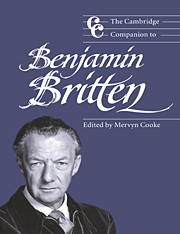16 - Old songs in new contexts: Britten as arranger
from Part four - The composer in the community
Published online by Cambridge University Press: 28 September 2011
Summary
Britten's folksong arrangements – mainly from the British Isles, with their gallery of lovers, soldiers, sailors, characters and genre scenes drawn from rural life – are strongly representative of the ‘English’ Britten and span a working life that extends from the time just before the return to England (and Peter Grimes) in 1942 to the stricken composer's last summer in 1976. Here is the composer who worked with the English language, whose feeling for oddity, humour and peculiar sentiment – for particularity – was rooted in a sense of place, in what remained (despite a widely travelled artist's sophistication) a villager's sense of local character: the kind of curiosity that prompted Forster to write on Crabbe or William Plomer to lecture on ‘Old Fitz’. Much of this feeling was strongly linked to an attraction towards – perhaps even a kind of nostalgia for – what might be termed the ‘expressive character and modes’ of life in eighteenth- and nineteenth-century England (the period settings, after all, of Peter Grimes, Albert Herring, The Little Sweep, Billy Budd, etc.). Britten's own native Suffolk – with its strong Victorian sea-side associations, its buildings and maritime history – still visually recalls this period, that saw the accumulation and collection of folk and ‘national’ songs dealing with a rapidly vanishing rural way of life. What makes this oeuvre distinct, however, is its absolute removal from the kind of ‘Englishness’ that maybe associated with the Edwardian pomp and pageantry of Elgar, or later characterized in the watery meadows and ‘gaffers on the green’ modal meanderings and rustic frolics of the school of the English folklorists.
- Type
- Chapter
- Information
- The Cambridge Companion to Benjamin Britten , pp. 292 - 305Publisher: Cambridge University PressPrint publication year: 1999
- 1
- Cited by



